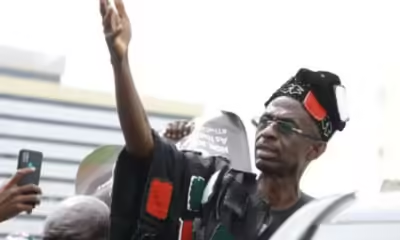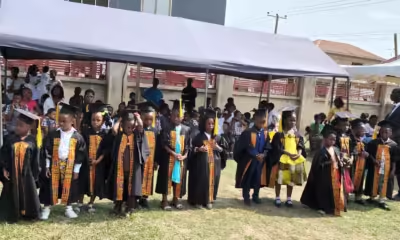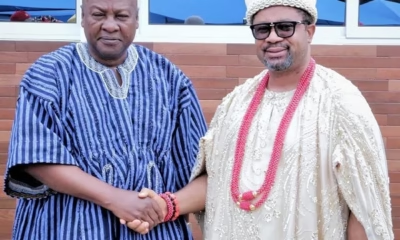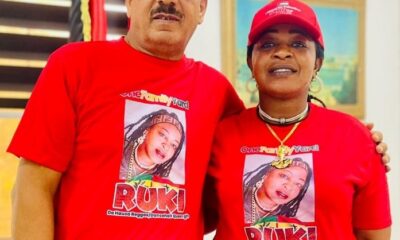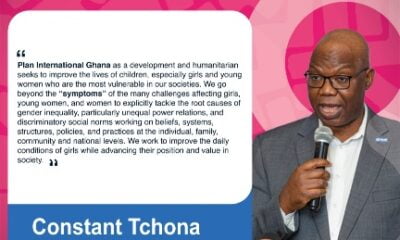Politics
Making ‘Herstory’, the politics of ‘representation matters’ and the Affirmative Action Act
Published
4 months agoon

Ghana started the year with the ‘herstoric’ First Female Vice President of the Republic sworn into office on January 7, 2025. For over 60 years after independence, our presidency has been led by men. This ‘herstory’ is therefore refreshing to note. However, this new dawn either illuminates our collective ambition or turn it grey depending on the layers of representation our dominant voices echo for women and other marginalised groups in this new government administration.
Making HerStory:
The annals of Ghana’s history have been re-written with the assumption of office of Prof. Naana Jane Opoku- Agyemang to the office of the Vice Presidency of the Republic. Our history and all of history has mostly been recounted in remembrance of men even though the arc of history affects both genders. The critical and sacred influence and significance of our women is often missing even if they had been pivotal in the salvation of our nation.
Yet history is very powerful as it connects the past to the present making it possible to embrace the future with hope and some certainty of success which we deny girls and women. Women like Hannah Kudjoe, Susana Alhassan, Leticia Quaye, Ayaoni Bukari, Rebecca Naa Dedei, Hawa Yakubu among numerous women having played integral roles in Ghana’s politics, are yet to receive their flowers after they have long been gone.
As we navigate this new political landscape in Ghana, with our smiling faces, we need to ask for more with a greater task to centre our activism on collective ‘herstory’.
The politics of representation matters:
The politics of ‘representation matters’ can be rooted in systemic heritage preservation. If not well articulated and utilised, it will become an effective way to create a gender parity mirage. Once in a while, the system gets one woman up there, cap it as inspiration, but use her for more marginalisation frames. Pray, this time, that one woman, lives above the system. That will be the real deal and the wild inspiration for more women to truly feel represented.
This may not be bothering to many Ghanaians but Gender Activists know the vision of their efforts and should continue to guard every ray of light even if the deck is stacked against us. We must also continue to check the flame of performance on collective gender representation in politics and public life by calling out politics that encourages tokenism to ensure the numbers count. Ghana has seen and felt the rise and decline in the numbers of women representation in our parliament over the years while political parties continue to pledge-play women empowerment and representation. Women need to muster the courage to hold political leaders accountable for their promises and uplift the full spectrum of representation. Else, we limp in opposite directions with our efforts and visions.
The Gender, Children and Social Protection (GCSoP) ministry needs to be reconsidered for a cabinet status to effectively deliver on its mandate to ensure gender mainstreaming in all sectors and for the critical empowerment of vulnerable groups. The GCSoP Ministry is a technical one, and a conscious effort must be made to choose individuals with the requisite skill-set, experience, expertise and qualifications to lead the charge with adequate resources.
The Affirmative
Action (Gender
Equity) Act:
Politics in Ghana is dominated by men and they tend to benefit more from the political system therefore wielding systemic and structural power. That’s why gender activism should be more focused on collective empowerment that gets us the representation we need and the time to do that is now with the Affirmative Action Act at hand. From the progressive 30 per cent to 50 per cent ambition of the Act, the new administration should commit to appointing not less than 30 per cent of women to serve the country in various capacities.
Men have enablers mostly as god-fathers and even god-mothers in our politics leaving women with the sustained challenge of who to hold their hand. Young women are starving for political god-mothers and it will be a rare privilege to give them a chance. In fact, it will be a radical revolution to have women in politics prioritise intentional mentorship for other women and girls. Clearly, it will take women themselves to change the matrix in order to achieve the gender parity set forth by the Affirmative Action Act.
From individual groundings to collective actions, women can inspire a democracy with grace and hope for the common and collective good. The clear existence of gendered power dynamics in Ghana’s democracy should awaken women’s agency to dream, accomplish, inspire, mentor, and pay it forward for girls and women in the country.
Conclusion:
The underrepresentation of women in politics and public life is a system that needs remade to ensure fairness and to promote good governance. As witnesses of this new ‘herstory’ in Ghana, we have a sacred duty to tell our unborn generations, that, this was not just about a ‘woman king’ but a grand ‘agojie’ army emerged as well and this can be possible if we take the holy act to ensure there is female familiarity with this administration through the appointments of more women into public offices in line with the Affirmative Action Act.
Congratulations to Ghana’s First Female Vice President, Prof. Naana Jane Opoku- Agyemang and to all the women who played critical roles in the 2024 general elections.
The writer is the Executive Director, FEAD/Gender Activist
BY HIKMAT BABA DUA
You may like


60 beekeepers trained in Volta, Oti regions


Dagbon bows in majesty to bid farewell to Late Mion Lana


GTA official honoured for outstanding support to TOUGHA


Naomi Ohene Oti makes Ghana proud …wins $250,000 Global Nursing Award in Dubai
Plan child birth to protect mother, child-UNFPA country rep


Address systematic issues surrounding juvenile correction — Child Rights Advocate
Politics
NPP youth asked to show interest in rebuilding process
Published
3 months agoon
February 25, 2025
The former Member of Parliament for the Assin Central Constituency, Kennedy Ohene Agyapong, has challenged the youth of the New Patriotic Party (NPP) to show keen interest in the rebuilding process of the party.
According to him the role of the youth in the rebuilding exercise cannot be overemphasised, however, it was important that they do more if the party wants to recapture power in 2028.
Speaking at the Freshers’ Orientation and General Meeting of the College of Health and Well-Being branch of the Tertiary Students Confederacy (TESCON) of the NPP on campus over the weekend, Mr Agyapong expressed his profound gratitude to the students for their dedicated services and loyalty to the party over the years.
He assured TESCON of his support and pledge to ensure that their welfare was taken care of given their role in youth mobilisation and projecting the ideals of the party on various platforms.
Mr Agyapong who is also a former aspirant of the flagbearership of the party donated an undisclosed amount of money to support the group’s activities and promised to fund activities of various TESCON branches across the country.
He subsequently called on senior members of the NPP and former government appointees to liaise with and work towards empowering TESCON to make the party more attractive on tertiary education campuses.
This he said would enhance the party’s acceptability among the youth.
He reiterated this commitment to the TESCON members of the University of Energy and Natural Resources in Sunyani, Bono Region, on the same day.
In response to suggestions for increasing the voting rights of TESCON from two to five per institution, he indicated his support for granting all TESCON executives of all accredited TESCON institutions voting rights during the party’s national elections.
This he said would significantly enhance the participation of more youth in the internal processes of the party.
Additionally, he affirmed his support for the expansion of the electoral college of the Party to include more members in a manner that protects the integrity of the Party’s structures.
Mr Agyapong explained that such a move would engender a sense of ownership, avert apathy and enhance democracy in and out of the party.
BY TIMES REPORTER

The Catholic Bishops’ Conference has accepted the apology from President Mahama for the omission committed by way of delaying the clergy’s invitation to the National Education Forum, currently taking place at Ho, the Volta Regional capital.
The Vice President of the Catholic Bishops’ Conference, the Most Reverend Emmanuel Kofi Fianu, who made this known at the forum, expressed the church’s gratitude to the President and the Minister for Education for the subsequent invitation of the church to be part of the event.
He said the vital role education played in national development could not be overemphasised, which called for collaboration of stakeholders to promote quality education.
Most Rev. Fianu said the Catholic Church was not happy about some appointments and transfers to and from Catholic schools without recourse to the church, and wondered whether there existed partnership in the education sector.
He stressed that the dissemination of information on educational matters without reaching out to a major stakeholder such as the Catholic Church was unacceptable.
Most Rev. Fianu lamented the unfriendly nature some education directors related to the Catholic Church, which according to him did not promote collaboration in the delivery of quality education.
He said that the over-population at second cycle schools which affected character formation, teacher-student ratio, teacher contact hours with individual students and proper supervision was of concern to the Catholic Bishops.
Most Rev. Fianu said the Catholic Church was against the use of its school compounds for structural development without any engagement with the church.
On national issues, he condemned the upsurge in social vices and corrupt practices in the country.
Most Rev. Fianu called for introduction of religious, moral, ethical and civic education that would lead to the production of responsible and productive citizens and not just knowledgeable and skillful individuals, who would become social misfit.
The President, on behalf of the Planning Committee of the National Education Forum said: “I’m aware that the omission was very speedily remedied, but you still deserve an unqualified apology for this oversight. And since you are the purveyors of God’s mercy on earth, I’m sure that you are forgiving us for this.”
President Mahama’s apology was in response to a joint statement issued in Accra by the Ghana Catholic Bishops’ Conference (GCBC) and the Christian Council of Ghana (CCG), expressing their disappointment in the government following their exclusion from the ongoing education forum.
The two bodies stated that even though the list of invitees to the national level stakeholders included some organisations that were affiliated to them, they as the parent bodies were excluded from the forum.
FROM SAMUEL
AGBEWODE, HO
Politics
Let’s separate politics from development —Prof. Agyeman-Duah
Published
4 months agoon
February 11, 2025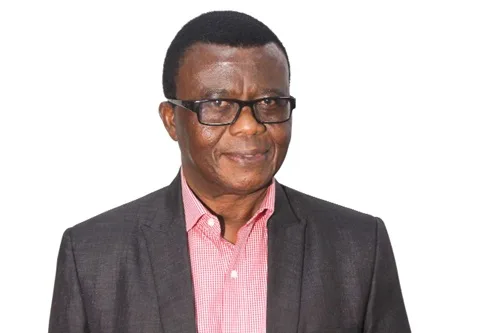
Former United Nations Governance Advisor, Professor Baffour Agyeman-Duah, has called for a clear separation between politics and national development to ensure development.
Speaking on Joy FM, an Accra-based radio station, he questioned the long-standing practice of newly elected presidents removing all key appointees of the previous government, regardless of their performance.
“I am not a constitutional lawyer, and I may not be too familiar with the Constitution, but I am not sure there is any provision requiring an elected president to sack all known appointees of the previous government and replace them with his own choices,” he said.
He acknowledged that some strategic positions, especially in the security sector, may require changes for national security reasons but criticised the “wholesale sacking” of appointees as a norm in Ghana’s political system.
According to him, this practice had existed across different administrations and was not unique to the current government under President Mahama.
“In my view, it doesn’t make sense to do that, but currently, the system allows it. So, it is not a matter of blaming Mahama or anybody. It is the system they inherit and the practice that has been going on,” he explained.
Prof. Agyeman-Duah pointed to Thailand as an example of a country that has successfully separated politics from development.
“In Thailand, politicians focus on governance while civil servants, who maintain professionalism, continue implementing policies and projects regardless of changes in government. Only top political functionaries are replaced,” he said.
He warned that without a shift in Ghana’s approach to governance and development, the country risks making slow progress, saying, “If we are not careful to change our development model, which should come with a change in mindset, we will move two steps forward and four steps backwards, and that really spells disaster for our country.”

60 beekeepers trained in Volta, Oti regions

Dagbon bows in majesty to bid farewell to Late Mion Lana

GTA official honoured for outstanding support to TOUGHA
Trending

 Politics9 months ago
Politics9 months agoVoter Register Discrepancies: NDC to stage nationwide protests against EC

 News10 months ago
News10 months agoArise Royals Montessori School Marks 2nd Graduation.

 News6 months ago
News6 months agoKing of Igbo Community in Ghana congratulates Mahama as President-elect of Ghana.

 Entertainment11 months ago
Entertainment11 months agoGhanaian musician Champions Gaza Peace with New Track

 More10 months ago
More10 months agoYoung people urged to develop their talents

 News11 months ago
News11 months agoCancer Support Network Foundation holds gala

 Entertainment11 months ago
Entertainment11 months agoSteps to receive an official GWR certificate – Details from mother of a Ghanaian record holder

 Women & Children10 months ago
Women & Children10 months agoPlan International Ghana Celebrates Milestone in Women’s Empowerment













